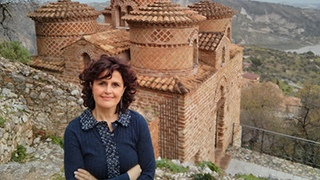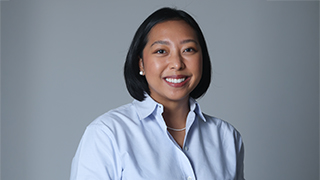Religion Professor Reflects on Legacy of Mother Teresa and Her Profound Eucharistic Life
Tuesday, September 10, 2024
Ines Angeli Murzaku, Ph.D., professor of Religion, Department of Religion, director, Catholic Studies Program, and founding chair, Department of Catholic Studies, provided insights on the life and legacy of Mother Teresa to the National Catholic Register in "Mother Teresa Feared Big Crowds - but She Loved Telling Them About the Eucharist." She discusses Mother Teresa’s participation in the 41st International Congress in Philadelphia in 1976, in her article, also published in New Advent. These reflections meaningfully coincide with this month’s Feast of Mother Teresa and the Tenth National Eucharistic Congress held in Indianapolis in July.
Murzaku, an internationally recognized authority on Mother Teresa, researched the letters and correspondence between Mother Teresa and Cardinal John Krol in the Archive of the Archdiocese of Philadelphia. She noted that Mother Teresa was characteristically humble in her correspondences with the Archbishop of Philadelphia, Cardinal John Krol, who invited her to be his guest “and play a featured role in one of the Congress programs dealing with the Eucharist and the hunger of people for food and the necessities of life.”
Mother Teresa explained that “I am very happy to share the Eucharistic Congress with your people, but I am afraid of the big crowds and my simple talk. I would be very happy if I did not have to speak but I leave it to you to decide whatever Jesus wants.”
Cardinal Krol’s response is particularly interesting:
We will certainly be delighted with your presence at the Eucharistic Congress. I can well appreciate your hesitancy about delivering a talk at the congress. I recall that Abraham, Moses, Jeremiah and other prophets also protested their inadequacy.
Murzaku notes Cardinal Krol’s emphasis on the importance of “simple talks” derived from firsthand experience, writing “He argues that such talks, while simple in delivery, are rich in theological content. He asserts that Mother Teresa’s speech at the Congress would fulfill this mission.”
Wrote Cardinal Krol,
We will have talks from learned men, but we need desperately the type of simple talks which our dear Lord himself gave. We need talks not simply to inform, but even more to inspire love for our Eucharistic Lord. We need very much the type of a talk which you gave in our Cathedral last year — a talk which is still remembered by those who were present.
Mother Teresa was particularly drawn to the theme of the Congress, “The Eucharist and the Hungers of the Human Family,” as it encapsulated the vision and mission of the Missionaries of Charity, the religious community she founded, explained Murzaku. She noted the theme underscored the significance of Holy Communion in the life of the community and the earliest version of the Missionaries of Charity reflecting Mother Teresa’s vision of a religious community centered around the Eucharist.
Murzaku concludes:
Her motto was to “drink the chalice to the last drop” and to be “unconditionally all
for Jesus.” The Christological and Eucharistic theology underpinning this maxim was
that God had given himself totally in the Eucharist; thus, she would give herself
totally to him through serving others. In doing so, she was emulating Christ himself.
Mother Teresa’s wholeness, or being “all his,” and her total dedication to Jesus and
the poor, sustained her throughout her life and during the dark night of the soul.
This was the essence of her theology and her definition of leading a Christian life:
Without the Eucharist, one cannot truly understand or willfully love God and neighbor.
Categories: Faith and Service







